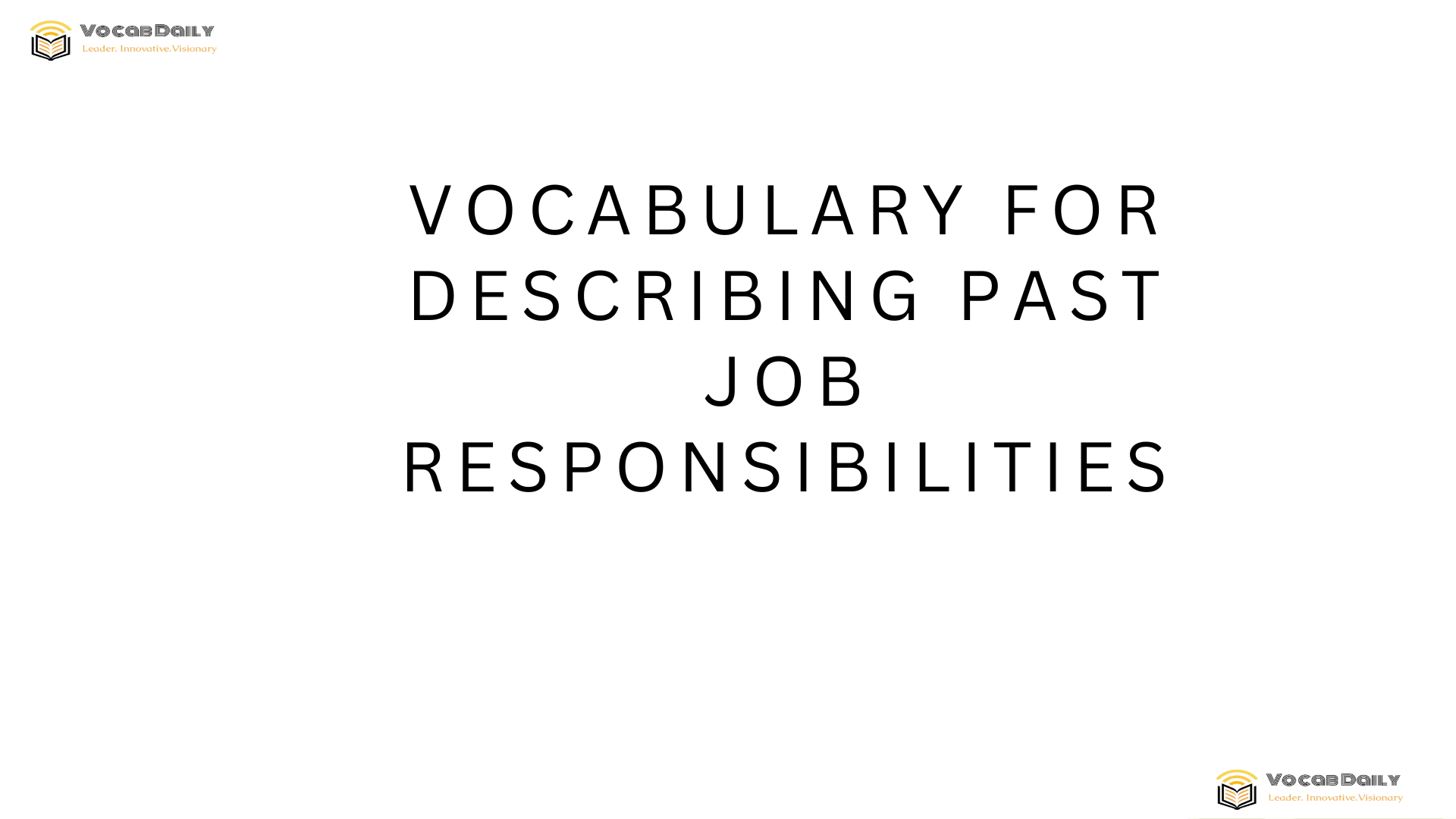Why Choosing the Right Vocabulary Matters
When preparing for job interviews, effectively describing your past job responsibilities is crucial. The words you choose not only showcase your skills and experience but also demonstrate your communication ability and professionalism. Using precise, dynamic vocabulary helps to create a strong impression on potential employers and highlights your qualifications in an impactful way.
Employers want to hear about your achievements, skills, and duties in a clear and compelling manner. Simply listing job duties can sound dull and may not differentiate you from other candidates. Instead, adopting a rich variety of verbs and descriptive phrases can breathe life into your past roles and provide evidence of your capabilities.
Action Verbs to Describe Past Job Responsibilities
One of the most effective ways to describe your responsibilities is by using strong action verbs. These verbs communicate what you did and imply the level of involvement and competence you demonstrated. Here are categories of action verbs tailored to different types of job functions:
Management and Leadership: led, supervised, coordinated, directed, managed, oversaw, motivated, facilitated, delegated, implemented
Communication: presented, communicated, collaborated, negotiated, conveyed, clarified, persuaded, advised, reported, counseled
Technical and Analytical Tasks: developed, analyzed, designed, tested, programmed, evaluated, engineered, automated, optimized, maintained
Creative and Marketing Roles: created, designed, brainstormed, crafted, promoted, published, developed, illustrated, conceptualized, edited
Administrative and Support Functions: organized, scheduled, filed, processed, supported, assisted, coordinated, maintained, tracked, documented
Adjectives and Adverbs to Enhance Descriptions
Adding descriptive adjectives and adverbs can provide clarity about the scale, impact, or quality of your work. For example, instead of saying “managed a team,” you can say “managed a large team” or “successfully managed a team,” which delivers more information about your role.
Some useful adjectives and adverbs include:
- Effectively
- Efficiently
- Proactively
- Consistently
- Significant
- Key
- Comprehensive
- Innovative
- Collaborative
- Detail-oriented
By combining these modifiers with your action verbs, you can craft compelling statements, such as “proactively resolved customer complaints” or “led a key project to completion ahead of schedule.”
Structuring Your Sentences for Clarity
When describing past responsibilities, clarity and conciseness go hand in hand. It is best to keep sentences straightforward while still demonstrating the complexity or significance of the work you performed. Here are some tips for structuring your sentences:
- Start with a strong action verb.
- Mention the task or responsibility clearly.
- Include quantifiable details where possible (numbers, percentages, timelines).
- Explain the outcome or impact briefly.
For example: “Coordinated a team of five employees to complete a client project two weeks ahead of schedule, improving customer satisfaction ratings by 15%.” This sentence clearly highlights your role, the size of the team, the timeline, and the positive result.
Vocabulary for Different Types of Responsibilities
Your past job responsibilities may vary widely depending on your industry or role. Here are some tailored vocabulary examples for common responsibility categories:
Customer Service and Client Relations
Engaged with clients, resolved issues, maintained positive relationships, addressed inquiries, ensured customer satisfaction, developed client retention strategies, communicated product benefits, managed feedback.
Project Management
Planned timelines, allocated resources, monitored progress, led cross-functional teams, mitigated risks, reported to stakeholders, developed project documentation, conducted status meetings.
Sales and Marketing
Generated leads, pitched products, analyzed market trends, designed campaigns, increased revenue, tracked sales metrics, collaborated with marketing teams, conducted competitor analysis.
Technical and IT Roles
Developed software, troubleshot issues, configured systems, maintained databases, optimized processes, wrote code, tested applications, ensured cybersecurity protocols, documented technical procedures.
Administrative Responsibilities
Organized files, scheduled appointments, maintained records, coordinated meetings, managed correspondence, prepared reports, processed invoices, supported executive teams.
Examples of Well-Worded Job Responsibility Statements
Below are some examples of how to effectively phrase your past job responsibilities using strong vocabulary and clear structure:
• Spearheaded the redesign of the company website, improving page load speed by 30% and enhancing user experience.
• Managed daily operations of a busy retail store, supervised a team of 10 staff, and increased monthly sales by 20%.
• Collaborated with marketing and design teams to launch a new product campaign, resulting in a 25% growth in customer engagement.
• Developed and maintained an internal database system that improved reporting accuracy and reduced data entry errors by 40%.
• Facilitated training sessions for new employees, ensuring understanding of company policies and procedures.
Tips for Practicing and Memorizing Vocabulary
To perform well in job interviews, practice describing your responsibilities using varied and precise vocabulary. Here are some strategies to help you improve:
- Write down your past job duties and rewrite them using new action verbs and descriptive phrases.
- Record yourself speaking about your previous roles, and listen critically to identify areas for more dynamic language.
- Use flashcards or vocabulary apps to learn relevant verbs and adjectives.
- Read sample resumes and interview guides to familiarize yourself with professional terminology.
- Practice mock interviews with friends or mentors and ask for feedback on your language use.
Avoiding Common Vocabulary Mistakes
While seeking to use impressive vocabulary, it is important to avoid certain pitfalls:
- Do not overuse complicated words; clarity is key.
- Avoid vague terms like “responsible for” or “helped” without elaboration.
- Do not exaggerate or use inaccurate vocabulary that misrepresents your skills.
- Avoid redundancy; vary your verbs and phrases to keep the description engaging.
Choosing the right vocabulary means balancing sophistication with simplicity and accuracy to ensure your experiences are clearly understood and appreciated by employers.
Also check out VocabDaily workbook collections.

Leave a Reply